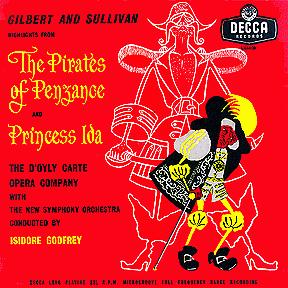The 1949 D'Oyly Carte Pirates
D'Oyly Carte Opera Company |
|
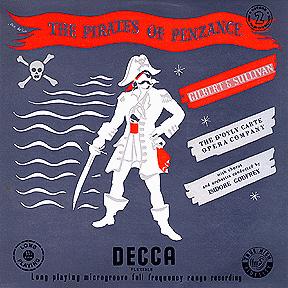 Decca LKM-4004/5 (New Zealand) |
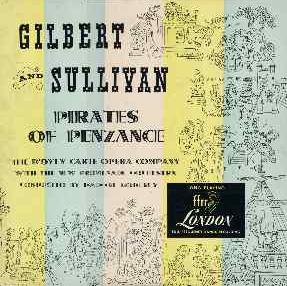 London LLP-80/81 |
During a thirteen-year period dominated by depression and WWII, the D'Oyly Carte issued no new G&S recordings. As if to make up for lost time, recordings started to appear at a prodigious pace once the Company finally re-entered the studio. The summer of 1949 was a busy one for the Company, as three new recordings were made, of which this was the last.
Unfortunately, it is an extremely poor reading of the opera. The acoustics seem cramped, and Leonard Osborn's account of Frederic is virtually unlistenable. However, as a document of beloved artists of the immediate post-war period, the recording will have its adherents. Chris Webster tells me that, in his new CD issue, he has been able to "clean up" the acoustic ambiance and background noise considerably.
Of the recordings made during Martyn Green's tenure, this has always been one of the hardest to find in America. By the time London decided to re-issue its older LP sets on the budget Richmond label, it had two Pirates recordings to choose from — this one and the 1957 recording with Peter Pratt. Since the latter set was in stereo, it was re-issued in lieu of the Green recording.
There also have been rumors that Green bought the rights to this recording, so he could keep it off the market and prevent it from competing with his own recording on RCA Victrola. This seems unlikely in light of Decca's 1973 re-issue on the then-dormant Ace of Clubs label, but this issue did not appear in the United States, and for this reason Pirates is one of the hardest of the Green sets to find.
The text is musically complete, except for the Police chant in Act II, a repeated section in the introduction to "Climbing over rocky mountain," and the middle of "Sighing softly to the river." The last two of these reflected D'Oyly Carte performance practice of the time.
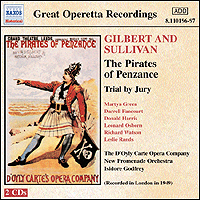 Naxos 8.110196-97 |
During the 1950's, Decca issued highlights of this recording (side 1), coupled with highlights of the 1955 Ida (side 2). The items included were as follows:
- Pour, Oh Pour The Pirate Sherry
- Oh, Better Far To Live And Die
- Oh, Is There Not One Maiden Breast
- Poor Wand'ring One
- I Am The Very Model Of A Modern Major-General
- When The Foeman Bares His Steel
- Ah, Leave Me Not To Pine
- When A Felon's Not Engaged
- To Gain A Brief Advantage (Finale)
Review by Michael Walters
I fully endorse everything Stan has said about the excellent quality of Chris's transfer, but I have to say that I find the recording itself only modified rapture! I listened to it very rarely on LP, now I understand why. What I am going to say is controversial, and I am sure many will disagree with me, possibly quite strongly!!
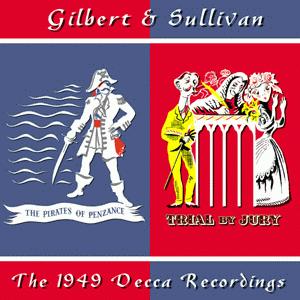 Sounds on CD VGS214 (Cover art by Matt Bland) |
The most disturbing aspect of the recording is Godfrey's stodgy 4-square pedantic conducting. The overture is as dreary as can be imagined. The opening chorus is little better, and Donald Harris (Sam) seems a competent but quite undistinguished baritone. He died young, so perhaps he never had a chance to find himself a personality. It is left to Ella Halman to bring the first piece of interest to the score. Though she has been described as a reliable but unimaginative performer, she is streets ahead of anything that had gone before. Fancourt's Pirate King is a vintage performance, but he is hampered by the dreary tempo. Was this really the sort of conducting that audiences in the theatre expected in 1949, or was Godfrey just nervous in the studio? It is Halman who injects most of the interest in the Ruth-Frederic duet. Osborn sounds as if he were sight-reading the part.
Things liven up (a bit) with the girls' entrance; at least this chorus know how to sing. Gillingham (Edith) has a certain charm, but is a trifle bland. Joyce Wright (Kate) has more personality, and is particularly interesting, as I am used to hearing a rather heavier voice in this role. Osborn is lacking in charm or personality, and sounds sounds strained on top with pedantic phrasing. Muriel Harding's "Poor wandring one" is impossibly laboured, she is simply not a coloratura; her top runs are almost painful. Martyn Green gives a technically faultless performance of the MG's song, but one is conscious throughout that it is Martyn Green rather than the character. It is sculpted, refined, carefully tailored, but never spontaneous. Studied (giving the appearance of) spontaneity, is surely an important ingredient of the patter roles.
Act 2 is a definite improvement on Act 1. The gentle opening of the opening chorus is fine and Harding's voice is entirely appropriate for her solo. However, the chief glory of this recording is Richard Watson's Sergeant of Police. This performance alone makes the set worthwhile having. His performance must be second only to Leo Sheffield. Green and the ladies give him excellent support. Osborn is quite convincing in the recitative leading into the Paradox trio. The Trio itself is splendid, both Halman and Fancourt managing to rise above the plodding tempi by the sheer force of the personality.
The Frederic-Mabel scene is poor, Harding injects most of what interest there is in the singing, but they both sound strained. Harding manages to put some feeling into "Ah, leave me not to pine" in spite of the positively ghastly orchestral introduction she gets. Osborn does not sound remotely like a man in love. He sounds like a totally failed attempt to emulate Derek Oldham.
Watson's second appearance is fully equal to his first. A joy. "Sighing softly" and the recitative leading into it sound studied and laboured. One is still very conscious of the care with which Green is treating the music, but he could profitably have taken some lessons from Watson in how to sound spontaneous.
| Date | Label | Format | Number | Comments |
|---|---|---|---|---|
| 1949 | Decca | 78rpm | AK 2315/25 | Automatic side couplings |
| London | 78rpm | T 5204/14 in Album LA-120 | ||
| 45rpm | 40021/31 in Album LGF 7 |
Automatic side couplings. Published in two volumes of six and five records each. | ||
| Mono LP | LLP 80/81 XLLP 80/81 |
|||
| 1950 | Decca | Mono LP | LK 4004/5 | |
| LKA 4004/5 | Australian issue | |||
| LKM 4004/5 | New Zealand issue | |||
| ca. 1953 | London | Mono LP | LL 80/81 | |
| 1956-7 | Decca | Mono LP | LK 4128 | Pirates and Ida highlights. Note that LKA 4128 was an Australian issue. |
| LKA 4128 | ||||
| London | Mono LP | LL 1243 | ||
| ca. 1956-7 | London | Mono LP | A-4202 | |
| 1957-8 | London | 45rpm | REP.8014 | Highlights |
| Late 1950s | London | Mono LP | 5170 | Pirates and Ida highlights |
| 1973 | Decca | Mono LP | ACL 1276/77 | |
| ACLA 1276/7 | Australian issue | |||
| 1979 | Decca | Mono LP | DPA 3051/52 | |
| ca. 1980 | Decca Viva | Mono LP | AUS 1014/5 | Australia/New Zealand issue |
| Cassette | KAUS 1014/5 | |||
| 1980s | Price-Less | Cassette | C 87999 | |
| 2000 | Sounds on CD | CD | VGS214 | With 1949 Trial by Jury |
| 2000 | Pearl | CD | GEMS0097 | With 1949 Trial by Jury |
| 2002 | Naxos | CD | 8.110196-97 | With 1949 Trial by Jury |
| 2004 | AVID | CD | AMBX138 | 10-CD set containing the entire nine-opera series recorded 1949–51, plus Pineapple Poll, the Overture ’Di Ballo’, and orchestral highlights (S. Robinson) from Pinafore and Yeomen |
| Side Nbr | Matrix Number |
Selection | Rec. Date |
|---|---|---|---|
| 1 | AR13914 | Overture, part 1 | 29 Jul 49 |
| 2 | AR13915 | Overture, part 2 | 29 Jul 49 |
| 3 | AR13916 | Pour, oh, pour the pirate sherry | 29 Jul 49 |
| 4 | AR13917 | Oh, better far to live and die | 29 Jul 49 |
| 5 | AR13918 | What shall I do? | 24 Aug 49 |
| 6 | AR13919 | Stop, ladies, pray! | 29 Jul 49 |
| 7 | AR13920 | 'Tis Mabel! | 29 Jul 49 |
| 8 | AR13921 | What ought we to do? | 24 Aug 49 |
| 9 | AR13922 | Stay, we must not lose our senses | 29 Jul 49 |
| 10 | AR13923 | I am the very model of a modern Major-General | 29 Jul 49 |
| 11 | AR13924 | Oh, men of dark and dismal fate | 29 Jul 49 |
| 12 | AR13925 | You may go, for you're at liberty | 29 Jul 49 |
| 13 | AR13926 | Oh, dry the glistening tear | 29 Jul 49 |
| 14 | AR13927 | Then, Frederic, let your escort lion-hearted | 29 Jul 49 |
| 15 | AR13928 | Now for the pirates' lair! | 24 Aug 49 |
| 16 | AR13929 | Away, away! | 29 Jul 49 |
| 17 | AR13930 | Ah, leave me not to pine alone | 29 Jul 49 |
| 18 | AR13931 | No, I am brave! | 29 Jul 49 |
| 19 | AR13932 | A rollicking band of pirates we | 29 Jul 49 |
| 20 | AR13933 | Hush, hush, not a word! | 29 Jul 49 |
| 21 | AR13934 | Now what is this, and what is that | 29 Jul 49 |
| 22 | AR13935 | To gain a brief advantage you've contrived | 29 Jul 49 |
Notes:
- For a discussion of the matrix numbers in these sets, see the matrix numbers discussion page.
